
Panelists discuss how the field is shifting from reactive to proactive management of dermatologic adverse events, with future developments potentially including new topical treatments and integrated dermatology support within oncology practices.

Your AI-Trained Oncology Knowledge Connection!


Panelists discuss how the field is shifting from reactive to proactive management of dermatologic adverse events, with future developments potentially including new topical treatments and integrated dermatology support within oncology practices.

Panelists discuss how the COCOON regimen's tolerability and effectiveness in reducing dose interruptions will improve patient experience and outcomes, requiring substantial nursing support and patient education for successful implementation in clinical practice.

Panelists discuss how the COCOON study demonstrated a significant reduction in grade 2 or higher dermatologic adverse events from 73% to 41%, with particularly notable improvements in face, body, and scalp rashes while maintaining comparable response rates.

Panelists discuss how the COCOON trial design represents a straightforward approach using standard practice medications, though implementation challenges include patient compliance with the complex 4-drug regimen requiring significant education and support staff involvement.

Panelists discuss how the COCOON study randomly assigned patients to either standard care or proactive dermatologic management using prophylactic antibiotics, topical treatments, skin moisturization, and anticoagulation to reduce grade 2 or higher dermatologic adverse events.

Panelists discuss how dermatologic adverse events with EGFR inhibitors are more severe than previously seen with third-generation tyrosine kinase inhibitors, requiring reactive management strategies including topical steroids, antibiotics, and dermatologic consultations that are often difficult to obtain.

Panelists discuss how patients with EGFR-mutated non–small cell lung cancer develop dermatologic adverse events with amivantamab treatment, presenting as papules, pustules, and paronychia that significantly impact quality of life.
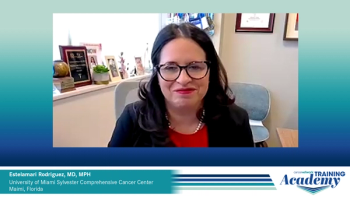
Estelamari Rodriguez, MD, MPH, presents a case of a 50-year-old African American woman, non-smoker, with pleural metastases; the panel discusses interstitial lung disease management, the use of antibody-drug conjugates, disease timing, and strategies for providing symptomatic relief, specifically considering drug holds if steroids only offer partial relief.
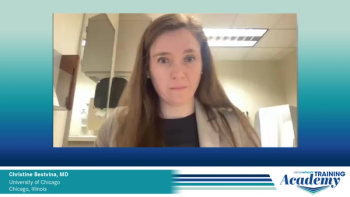
Christine Bestvina, MD, presents a case of a 34-year-old non-smoker diagnosed with Stage IIIA NSCLC after presenting with chest wall pain; the panel then explores their approaches to managing toxicities, including rashes and sores, by employing dose reductions and steroids to control adverse reactions.

Alexander Spira, MD, PhD, FACP, presents a case of a 45-year-old male with stage IV NSCLC, bone and liver metastases, and an EGFR exon 20 insertion; the panel then discusses their approach to treating brain metastases using stereotactic radiosurgery radiation therapy.
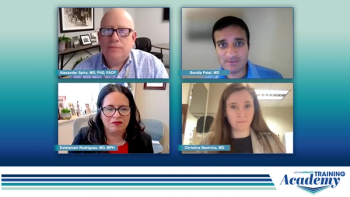
The panelists explore the importance of communicating with patients, nurses, and caregivers about potential adverse reactions and injection site reactions, while emphasizing the need to offer ongoing reassurance and support throughout the treatment journey.
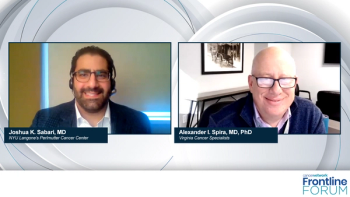
Alexander I. Spira, MD, PhD, and Joshua K. Sabari, MD, conclude their discussion with key takeaways on the evolving treatment of patients with NRG1 fusion–positive malignancies.

The expert panel discusses NRG1 fusions in pancreatic cancer and the potential role of zenocutuzumab as a therapeutic option.

Alexander I. Spira, MD, PhD, and Joshua K. Sabari, MD, discuss ongoing clinical trials focused on NRG1-targeted therapies.

Clinical insights on the diagnosis of NRG1 fusions in patients with non–small cell lung cancer.

Medical oncologists review testing practices for NRG1 fusions for patients with pulmonary or gastrointestinal malignancies.

Alexander I. Spira, MD, PhD, and Joshua K. Sabari, MD, discuss the prevalence of NRG1 fusions in pulmonary and gastrointestinal solid tumors and provide an overview of treatment practices.
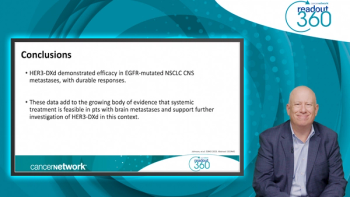
A medical oncologist reviews intracranial efficacy data from HERTHENA-Lung01 on patritumab deruxtecan (HER3-DXd) in patients with previously treated advanced EGFR-mutated NSCLC.

Alexander I. Spira, MD, PhD, FACP, reviews recent data from MARIPOSA-2 looking at amivantamab plus chemotherapy, with or without lazertinib, in EGFR-mutated advanced NSCLC.

Experts discuss the current continuum of care for patients with EGFR exon 20 non–small cell lung cancer and findings from studies including the phase 2 CHRYSALIS trial.




Alexander Spira, MD, PhD, FACP, of the Virginia Cancer Specialists, discusses how the FDA approval of adagrasib for KRAS G12C–mutated non–small cell lung cancer can provide benefit for this patient population.
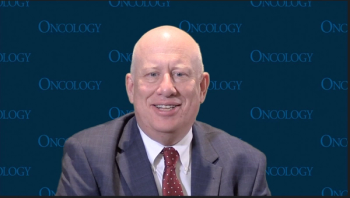
Alexander I. Spira, MD, PhD, FACP, details the safety profile of single-agent adagrasib in patients with KRAS G12C–mutated advanced or metastatic non–small cell lung cancer, as well as plans for future research following the phase 1/2 KRYSTAL-1 study.
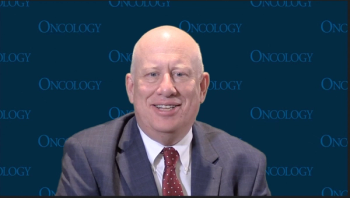
Treatment with adagrasib monotherapy yielded an overall response rate of 42.9% in patients with KRAS G12C–mutated advanced/metastatic non–small cell lung cancer, according to Alexander I. Spira, MD, PhD, FACP.
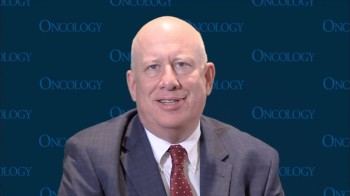
Alexander I. Spira, MD, PhD, FACP, highlights several unanswered questions within the KRAS G12C–positive non–small cell lung cancer space.
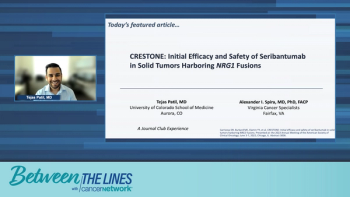
Looking toward the future management of solid tumors with NRG1 fusions, expert panelists consider how the availability of seribantumab therapy may impact their practice.
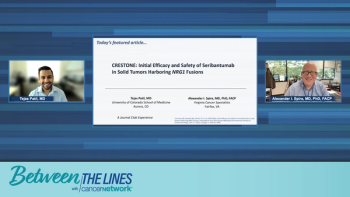
A brief review of key takeaways from the CRESTONE clinical trial of seribantumab therapy in solid tumors with NRG1 fusions.
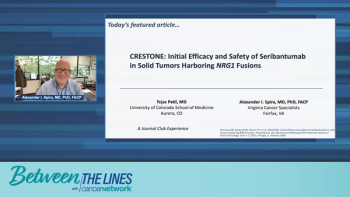
Closing out their review of data from the CRESTONE clinical trial, expert panelists highlight the duration and depth of response with seribantumab therapy.
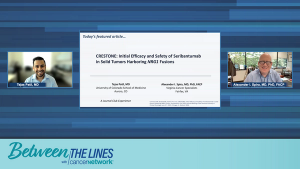
Published: July 7th 2022 | Updated:

Published: August 20th 2021 | Updated:
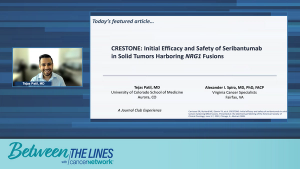
Published: July 20th 2022 | Updated:
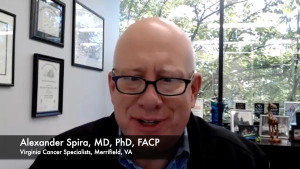
Published: September 25th 2021 | Updated:

Published: May 1st 2024 | Updated:

Published: July 14th 2022 | Updated: